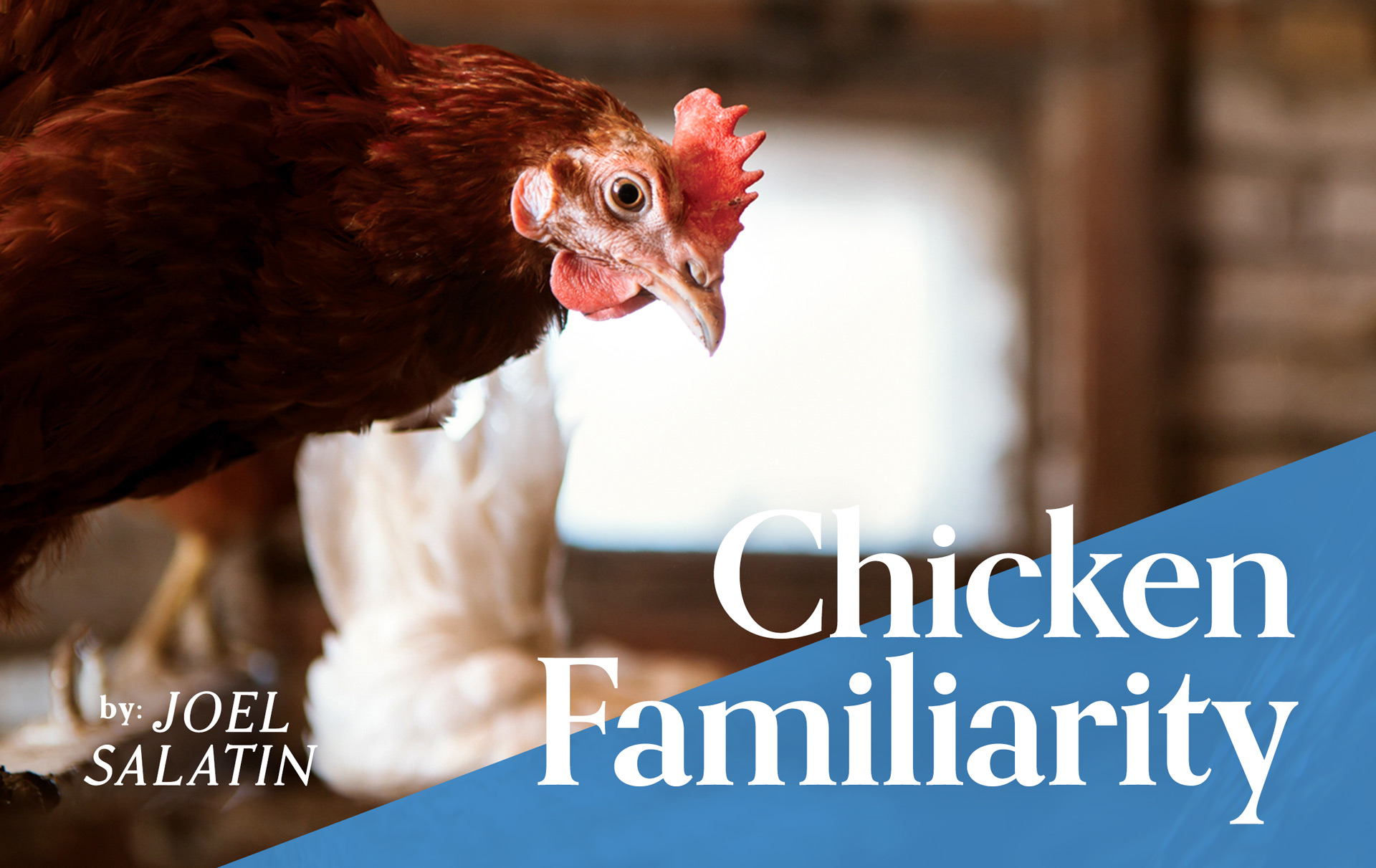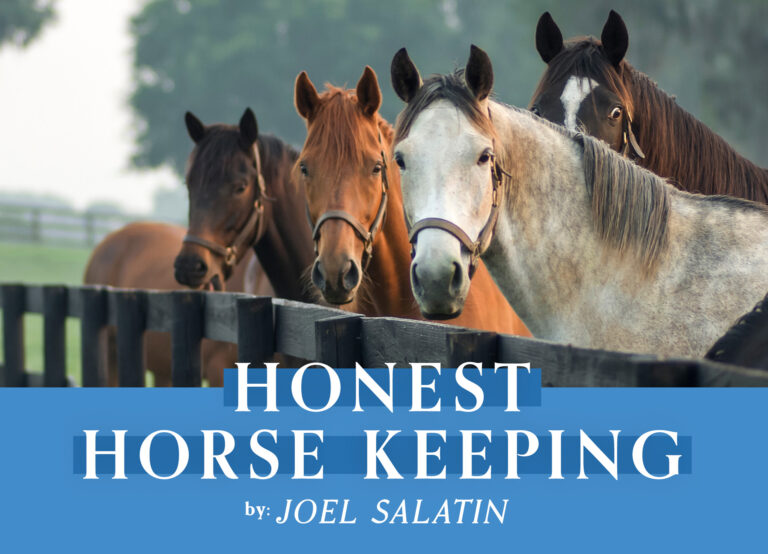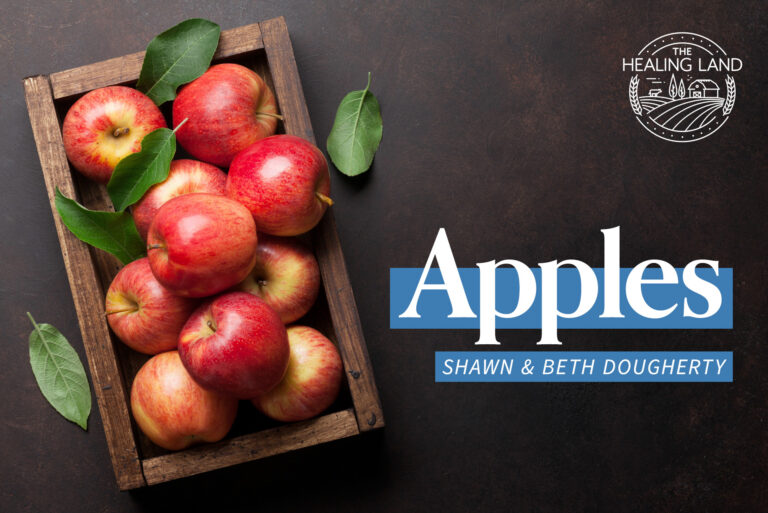By Joel Salatin, Plain Values
Thinking like an animal is not always easy, especially if you’re trying to think like a chicken. In this article, I want to dive into one of the single biggest tensions in raising farmstead egg-laying chickens, and it all stems from chicken psychology.
Like all animals, chickens love routine. Temple Grandin, maven of animal psychology, points out that animals live only in the moment. Yes, they have memory, but they have no datebook. They never think about what they need to do tomorrow.
Everything is about instant gratification. No chicken ever said to her friends, “That hen is kind of small and timid; let’s let her have first go at the feeder, and the rest of us ladies will join her later.” You’ll never see that happen. Henpecked is a real thing. Sometimes they eat each other. Animals always eat dessert first, they are all bullies, and they don’t like change.
Temple Grandin says chickens live so much in the moment that they notice the color of your hat. They notice what kind of clothes you’re wearing and your facial demeanor. Let it be established once and for all: chickens like routine. They don’t like different. To be sure, they like chasing down worms in different locations, but they’re not thinking about their location; they’re just eating worms. The moment is all that matters. While chasing down worms, the hen may have no idea she just traversed a hundred yards. Sometimes they look up with a lost look. Most of the time, they want to be where they are accustomed.
What that means is that laying hens want a secure home. They don’t want you to change coops on them. They want to sleep in the same spot every night. They want to lay eggs in the same place every day. Don’t confuse routine with discovery. Chickens have unlimited time to scope out new and interesting places. That’s part of their routine, just like a goat’s routine is trying to figure out a more clever way to escape.
If a chicken finds an enjoyable place, she’ll return to it. Exploration then gives way to familiarity. This is an issue on smaller acreages that want to free-range laying hens. Hens offer a boatload of benefits, from eating kitchen scraps to eliminating ticks to spreading cow pies. No farmstead animals work harder to provide benefits than the lowly hen. But she’s curious, explorative, and always looking for something familiar.
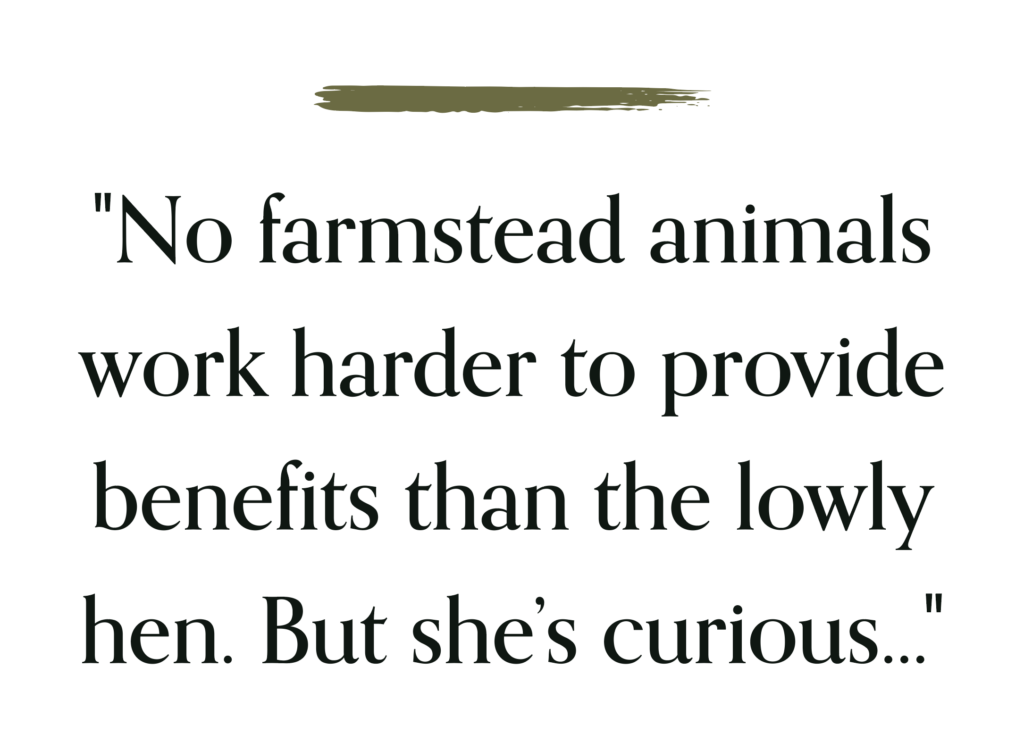
She’ll range out a couple hundred yards from security. Normally that security is where her feed, water, nest, and sleeping quarters are. In smaller acreages, that range might easily cover the entire property. That’s when familiarity kicks in. If you use portable housing, like what I call an eggmobile, you can’t move it far enough away from familiar territory to keep the hen from going back to a favorite spot.
I do not recommend eggmobiles for acreages under 50 because you can’t move them far enough into unfamiliar territory to break their routine of returning to something familiar. And you know what familiar is. It’s the lawnmower handle, the porch swing, the tractor steering wheel. Those are nice roost spots. How about nests? That secluded spot in the corner of the hay barn or a bundle of twine in the back of the shop attract the exploring chicken, and suddenly she has a new familiar routine. The change of nesting place means her caretaker now enjoys an Easter egg hunt every day instead of finding the eggs in designated nest boxes.
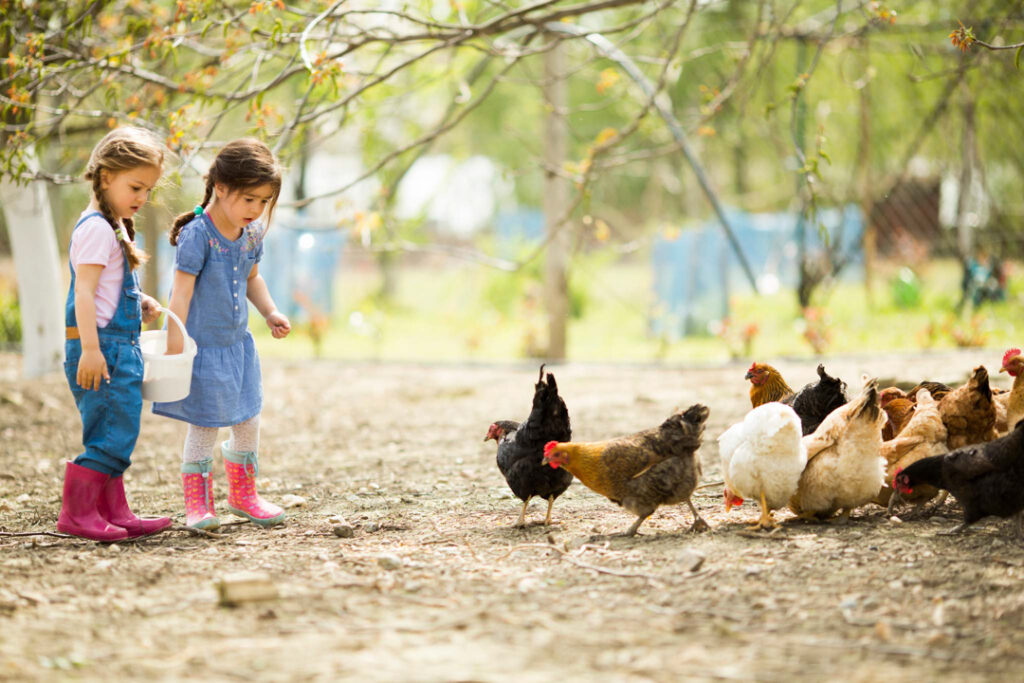
Whenever someone asks me about chickens laying in fencerows and non-nest box areas, I know immediately they aren’t moving the eggmobile often enough and far enough to make sure that the hen’s only imposed familiarity is with the eggmobile. If she can wander to a more familiar spot, she’ll gladly walk quite a distance to return to her routine.
This creates a conundrum for the smaller acreage outfit. How do you get the chicken benefits without losing the chicken to her own desires? You can’t afford to hunt for eggs every day. And you can’t have the hen picking any old predator-prone sleeping area. But you do want her scratching through dung, eating ticks, grasshoppers, and crickets.
If your acreage is extremely small (under 5 acres), you don’t gain much advantage from having a portable coop. Situate a Fort Knox secure coop as near to the middle of the acreage as possible, use deep bedding (I’ve described this in previous columns as a carbonaceous diaper), and let her generate some world-class compost for you. If you want a portable coop on such a small acreage, that’s fine, but it certainly isn’t necessary.
While I’m a fan of portable infrastructure, it offers diminishing returns at extremely small acreages because having an all-season design is nearly impossible in most climates. A portable coop with two feet of snow on the ground isn’t fun to service, and the hens are cold and unhappy too. A nice warm stationary coop with deep bedding is a far more comfortable place to ride out a blizzard. Rather than building a summer and winter coop, therefore, you can put all your effort into one good coop strong enough to withstand raccoons and bobcats, snug enough to handle a blizzard, with enough ventilation options to be comfortable on hot summer days.
If your acreage is larger than five, you probably want a summer portable and a winter stationary shelter. We use hoop houses for winter. Now back to familiarity. Regardless of what you decide to do, by only letting the birds out one day a week you can force familiarity on their coop and not compromise it with other momentary attractive places. They won’t be exploring around the farmstead often enough to develop an attraction to a spot of their choosing. At one day a week, you can guarantee nonfamiliarity, and the birds will return to their coop, whether stationary or portable, to lay eggs and sleep.
Since our farm is more than 50 acres, we can move the eggmobile hundreds of yards at a time, every day. They never get familiar enough with their area to establish a new nesting spot or new roosting area. They constantly return to the eggmobile because that’s the only thing in their awareness that meets the familiarity criteria. If we parked it for a week, we’d start having to hunt for eggs. And we’d find chickens in strange places. By moving it long distances, every day or two, the birds are in completely unfamiliar surroundings and that keeps them within sight distance of the eggmobile because they don’t feel comfortable settling down anywhere else.
The key is familiarity. The only way I know to achieve unfamiliarity in a small acreage situation is to deny the birds access. If you limit their free-range exploration to one day a week, they don’t have enough time to get familiar enough with their surroundings to be lured away from their coop, whether it’s stationary or mobile.
When chickens find favorite spots, like your garden or the barn, they definitely want to return to it the next chance they get. They aren’t stupid; they know where enjoyable scratching and picking are. They know where the big grubs are. In returning to those spots, they aren’t thinking about vulnerability to predators. They aren’t even thinking about vulnerability to rain. All they care about is the moment.
I recommend the weekly release coincide with your outdoor work. Small flocks are more vulnerable to aerial predation than large flocks. Plan to release the birds to your small acreage when you’re working in the garden or splitting firewood. You can listen for that telltale hawk screech, and you’ll enjoy the chickens as company. They’ll surely want to hang around wherever you’re working. That adds joy and friendship to your chores.
The reason I belabor all this is because small acreage folks more often fantasize about their 50 hens sanitizing their farmstead, scratching and pecking contentedly. The reality is lots of predation, hunting for eggs, and sitting on chicken poop left at the porch swing. Fantasy turns to frustration, and that’s not good for anyone.
Numerous entrepreneurs, bless ’em, have designed and built little eggmobiles for folks with a handful of chickens to enjoy. The heart is sincere, and the desire is good. But chickens have a mind of their own, and our fantasies don’t always conform to their realities. On large acreages, eggmobiles work beautifully, and the chickens’ functionality is a true asset to the farming operation.
But small acreages present unique challenges and opportunities. Limiting familiarity is the best way I know of to get all the benefits chickens offer without the negatives. You will never find a partner more willing to work harder for less, but you have to appreciate the desires and habits of the partner. Providing a working habitat where you, the ecology, and the chicken can win is the goal. Happy clucking. //
This article was published in the July 2022 issue of Plain Values Magazine. If you want the latest stories every month, subscribe to the magazine HERE. As a special thanks, get 10% off your subscription with the code “GAB23”!

Joel Salatin co-owns, with his family, Polyface Farm in Swoope, Virginia. Four generations of his family currently live and work on the farm, and his farm services more than 5,000 families, 50 restaurants, 10 retail outlets, and a farmers’ market with salad bar beef, pigaerator pork, pastured poultry, and forestry products. When he’s not on the road speaking, he’s at home on the farm, keeping the callouses on his hands and dirt under his fingernails, mentoring young people, inspiring visitors, and promoting local, regenerative food and farming systems. Salatin has published 15 books, and he is the editor of The Stockman Grass Farmer, granddaddy catalyst for the grass farming movement. He passionately defends small farms, local food systems, and the right to opt out of the conventional food paradigm.


